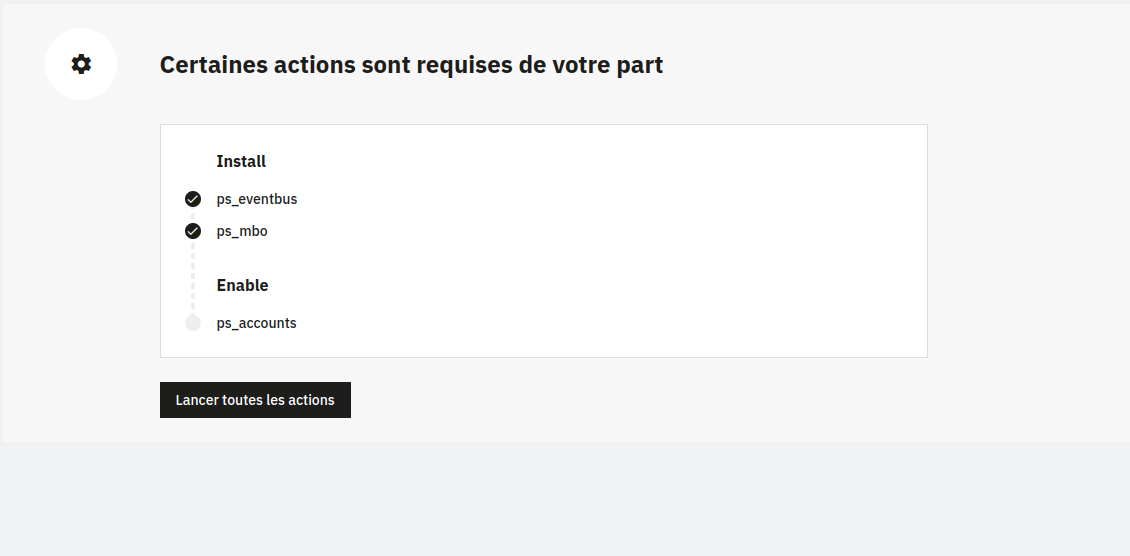prestashop / module-lib-mbo-installer
A helper to ease the download PS MBO from the Addons Marketplace
Installs: 33 769
Dependents: 1
Suggesters: 0
Security: 0
Stars: 3
Watchers: 13
Forks: 2
Open Issues: 5
pkg:composer/prestashop/module-lib-mbo-installer
Requires
- php: >=5.6
- ext-json: *
Requires (Dev)
- phpstan/phpstan: ^1.9
- phpunit/phpunit: ^9.5|^8.5|^5.7
- prestashop/php-dev-tools: ^4.2|^3.16
This package is auto-updated.
Last update: 2026-01-28 23:29:05 UTC
README
The goal of this package is to help managing module dependencies.
Let's explain it with an actual case
Supposing our module needs modules A and B to work properly.
We will have to install this module-lib-mbo-installer and have a file named module_dependencies.json in the root folder of our module containing
{
"dependencies": [
{
"name" : "A"
},
{
"name" : "B"
}
]
}
The lib will start by checking if PS MBO (Marketplace in the Back Office) is installed and enabled.
MBO needs to be installed first because we download other modules from the marketplace.
Then it will check for the modules A and B
Installation
composer require prestashop/module-lib-mbo-installer
Version Guidance
| Version | Status | Packagist - | Namespace | Repo | Docs | PHP Version |
|---|---|---|---|---|---|---|
| 3.x | Latest | prestashop/module-lib-mbo-installer |
Prestashop\ModuleLibMboInstaller |
main | N/A | >=5.6 |
| 2.x | Unmaintained | prestashop/module-lib-mbo-installer |
Prestashop\ModuleLibMboInstaller |
v2.0.0 | N/A | >=7.2 |
| 1.x | Unmaintained | prestashop/module-lib-mbo-installer |
Prestashop\ModuleLibMboInstaller |
v1.0.0 | N/A | >=5.6 |
Usage
You have 2 methods available
- DependenciesBuilder::handleDependencies() : this method will return you the status of all the dependencies, including MBO, in an array
[
'module_display_name' => string // your displayed module name
'module_name' => string // your module tech name
'module_version' => string
'ps_version' => string
'php_version' => string
'locale' => string // the shop locale
'dependencies' => [ // an array of all the dependencies defined + MBO
[
'name' => 'ps_mbo'
'installed' => bool
'enabled' => bool
'current_version' => string
'install' => string // route to install the module, if relevant
'enable' => string // route to enable the module, if relevant
'upgrade' => string // route to upgrade the module, if relevant
],
[
'name' => string // a dependent module
'installed' => bool
'enabled' => bool
'current_version' => string
'install' => string // route to install the module, if relevant
'enable' => string // route to enable the module, if relevant
'upgrade' => string // route to upgrade the module, if relevant
],
...
]
];
- DependenciesBuilder::areDependenciesMet() : this method will return you whether all the dependencies, including MBO, are installed and enabled
These 2 methods will help you gather informations about your dependencies and allow you to perform actions to resolve them.
Examples of implementation
In most of the cases you'll want to show the dependencies of your module in the configuration page, to allow the "user" to fix them
You can use one of the examples above in the getContent method of your module's main file
Use the given public CDC
In your module
$mboInstaller = new Prestashop\ModuleLibMboInstaller\DependencyBuilder($this); $dependencies = $mboInstaller->handleDependencies(); $this->smarty->assign('dependencies', $dependencies); return $this->display(__FILE__, 'views/templates/admin/dependency_builder.tpl');
In the template
<!-- Load cdc library --> <script src="https://assets.prestashop3.com/dst/mbo/v1/mbo-cdc-dependencies-resolver.umd.js"></script> <!-- cdc container --> <div id="cdc-container"></div> <script defer> const renderMboCdcDependencyResolver = window.mboCdcDependencyResolver.render const context = { ...{$dependencies|json_encode}, onDependenciesResolved: () => console.log('Everything works!'), onDependencyResolved: (dependencyData) => console.log('Dependency installed', dependencyData), // name, displayName, version onDependencyFailed: (dependencyData) => console.log('Failed to install dependency', dependencyData), onDependenciesFailed: () => console.log('There are some errors'), } renderMboCdcDependencyResolver(context, '#cdc-container') </script>
This example uses our public CDC which will display a page with the status of the dependencies and an action button to resolve them all
Do it yourself
In your module
$mboInstaller = new Prestashop\ModuleLibMboInstaller\DependencyBuilder($this); $dependencies = $mboInstaller->handleDependencies(); return $this->render( '@Modules/examplemodule/views/templates/admin/dependency_builder.html.twig', [ 'dependencies' => $dependencies, ] );
In the template
<script> $(document).on('click', '.module_action', function(event) { event.preventDefault(); const moduleName = window.$(this).attr('data-module') window.$.ajax({ method: 'POST', url: window.$(this).attr('data-url'), }).done((response) => { console.log(response[moduleName]) if (response[moduleName].status === true) { window.$.growl.notice({message: response[moduleName].msg}); window.location.reload(); } else { window.$.growl.error({message: response[moduleName].msg}); } }); }) </script>
{% for dependency in dependencies.dependencies %}
<div>
{{ dependency.name }} :
{% if dependency.installed is same as(true) and dependency.enabled is same as(true) %}
OK
{% elseif dependency.installed is same as(false) and dependency.install is defined %}
<a class="btn btn-primary module_action" href="#" data-module="{{ dependency.name }}" data-url="{{ dependency.install }}">
Install
</a>
{% elseif dependency.enable is defined %}
<a class="btn btn-primary module_action" href="#" data-module="{{ dependency.name }}" data-url="{{ dependency.enable }}">
Enable
</a>
{% else %}
NOK
{% endif %}
</div>
{% endfor%}
The module builtforjsexample is an example of integration of MBO installer, where the steps previously detailed have been applied.

